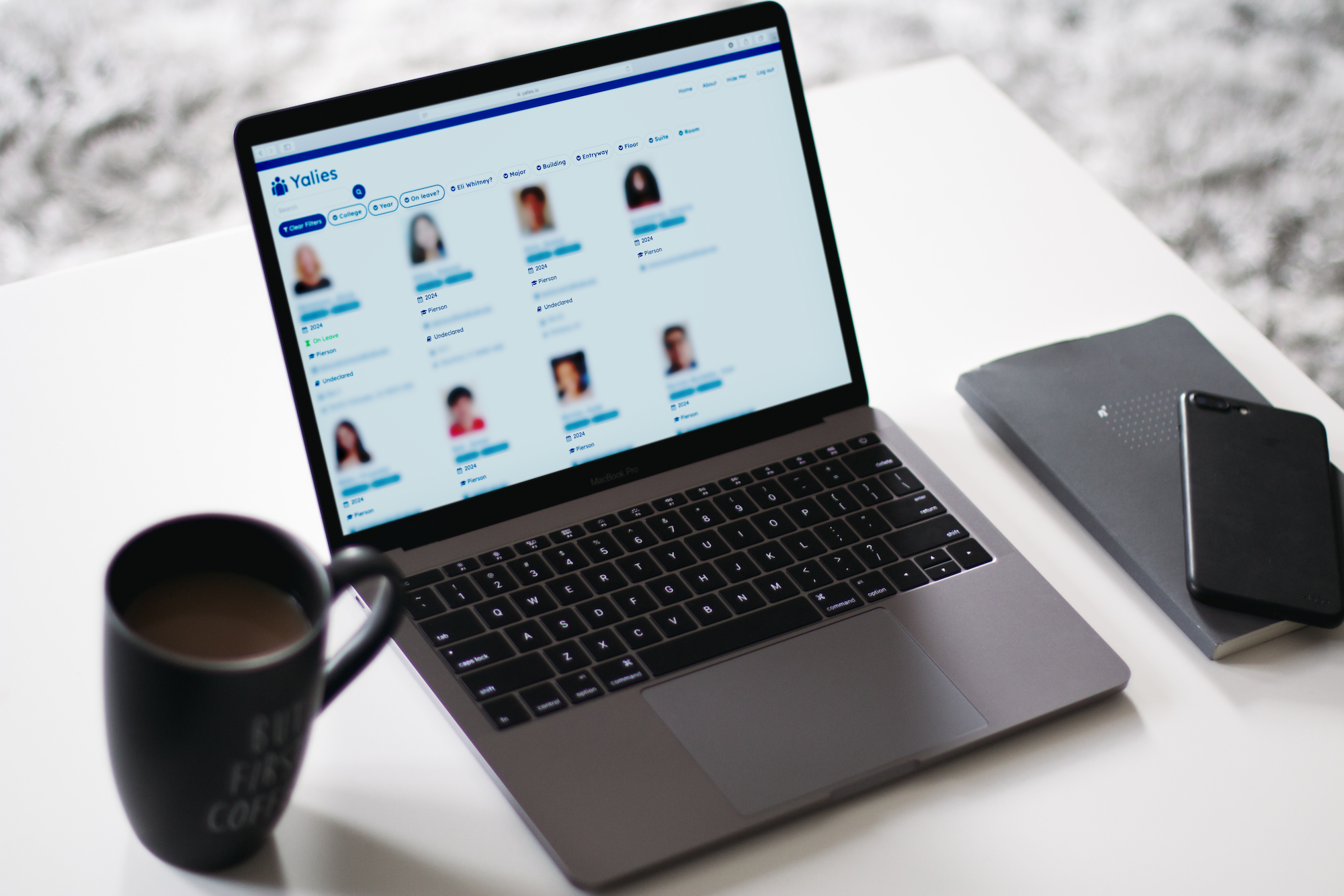
Zoe Berg, Photo Editor
The digital footprint of Erik Boesen ’24 is bigger than most. During his first year at Yale, the computer science major helped revamp the Yale Menus app, introduced an online GroupMe bot and debuted ComeThru, a party-finding app for Yale students, last spring.
In recent weeks, Boesen has turned his attention toward a new project: a sleeker, independent version of Yale Facebook, the existing Yale student directory. Boesen’s project, Yalies.io, debuted on Sept. 27 — the culminating effort of 11 days’ worth of programming.
“I thought the existing user interface could be dramatically improved,” Boesen said. “I like to see technology that is well-designed and modular.”
The website scrapes, or gathers, the existing data that is currently available to holders of Yale email accounts from Yale Facebook and the Yale Directory. Like Yale Facebook, Yalies.io allows Yale College students to view a peer list of the entire undergraduate student body, complete with details about their graduation year, residential college, Yale email address and major. Students can also view headshots of their peers — the same photos documented on official Yale channels.
According to Boesen, the site had 400 users in the first two days following its launch, and more than 545 registered visitors have interacted with the platform as of Monday evening.
There are two additional features that Boesen has been able to integrate into the new platform that are not explicitly discoverable on Yale’s official sites: site visitors are able to see whether or not students are on a leave of absence and whether or not they are an Eli Whitney student.
In order to obtain this information, Boesen compared a copy of last year’s Yale Facebook to the current one. He was also able to use graduation years to determine a student’s Eli Whitney status, since those students are the only ones listed without a graduation year.
“I just thought it was kind of weird that our NetID and the number from our swipe cards were on there, since I’d thought they were supposed to be private,” said Avery Brown ’23. “Apparently they’re also published in the official student directory anyway though, so this isn’t really doing anything new besides making all this info easier to find.”
Boesen was quick to note that he’s not pulling any private data from Yale student accounts that isn’t already available online.
“My original instinct was that Yale provides this data, so I would provide this data,” Boesen said. “So any privacy issues are not on my hands.”
Nevertheless, as word about the new website circulated on social media platforms, some students openly criticized the site for breaching their privacy rights by hosting data such as a student’s room number and address on the website.
Boesen said that after reading social media posts and fielding questions from concerned peers, he changed his approach and decided to limit the kinds of personal information viewable on his site.
No longer does a student’s identifying housing information appear directly under their headshot. Instead of their full addresses, the site lists a student’s hometown and state or country.
Boesen maintained that including room numbers on the site may be useful. For instance, during rush and recruitment events, upperclassmen and student organization leaders may frequently surprise new members in their suites, he said.
Still, he decided to remove suite and room information from each student’s display under their headshots, though it can still be gleaned from the website’s drop-down menus. That information, provided a student hasn’t already opted out, remains available on the official Yale Facebook.
“I realized I had a little leverage to encourage students to take control of their own data and be aware of what’s there,” Boesen added. “If anything, I’ve done more to draw attention to student privacy than Yale ever has.”
Now, first-time users logging into the site will see a pop-up window which clarifies the source and location of their personal information. Also newly added on the site is a set of directions for individuals who wish to scrub identifying information from official Yale channels. Logged-in students can edit their display to exclude their photo, email, room number, home address, major and birthday — all information that is automatically available to anyone with access to Yale’s Directory.
Since Boesen’s web interface feeds directly from Yale sources, changes made to the student directory will immediately trickle into Yalies.io.
Through the federal Family Educational Rights and Privacy Act, the University is permitted to disclose basic “Directory Information” about students without obtaining permission, but students can file a request to withhold that information through the Registrar’s Office.
A past student-created platform ran into a thorny data policy dispute with the University. In 2014, CourseTable — a course selection site built by Peter Xu ’14 and Harry Yu ’14 that allowed students to see course descriptions as well as student ratings and reviews — was blocked on University networks.
Neither Yale’s chief privacy officer nor chief information officer responded to requests for comment.
Boesen said he has not been contacted by any Yale administrators — yet. According to Boesen, he plans on continuing to maintain the website unless he encounters University pushback.
Boesen is also in the process of making a Yalies.io mobile app.
He does not plan for the app to include any new search criteria or features, though he noted that the Yale Facebook is “clunky” when accessed by phone.
Victor del Carpio ’23 also contributed to developing the user interface for the mobile app.
“I like the project because it’s something that’s useful,” del Carpio said. “The Yale Facebook’s searching capabilities are pretty antiquated and so I like that this project offers an alternative to that.”
The app is still in progress but may debut soon.
Emily Tian | emily.tian@yale.edu
Correction, Oct. 8: A previous version of this article identified one of the two student creators of CourseTable incorrectly. His name is Peter Xu.







